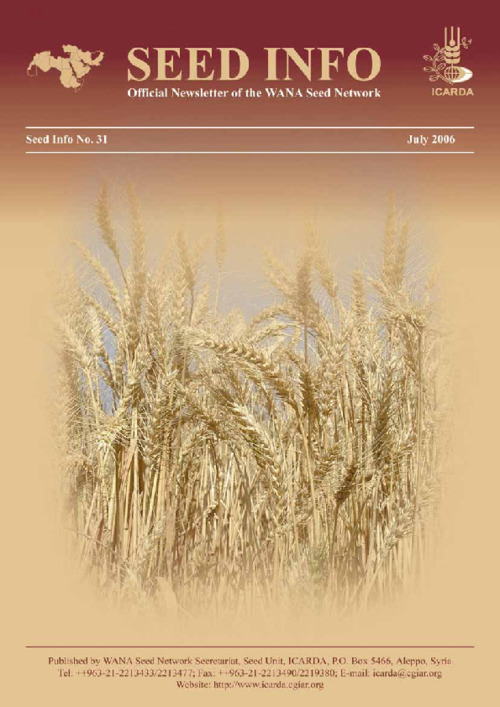Seed Info No. 31
Abstract
Seed Info aims to stimulate information exchange and communication among seed staff in the Central
and West Asia and North Africa (CWANA) region. The purpose is to contribute towards the development of
stronger national seed programs which supply quality seed to farmers.
In this issue of Seed Info we report on International Seed Trade Conference 2005 for the CWANA Region held from 29 November to 1 December 2005 in Antalya, Turkey. It was the first international seed trade conference organized by the Turkish Seed Industry Association and the Seed Unit of ICARDA in which 222 persons from over 40 countries of Asia, Africa, Europe and the Americas participated. Your editor, Zewdie Bishaw and colleagues will provide a detailed report on the conference.
N.P. Louwaars, our regular contributor from Wageningen University and Research Center (Wageningen UR), is revisiting the impacts of the International Plant Genetic Resources Treaty, i.e. the Convention on Biological Diversity (CBD) and International Treaty on Plant Genetic Resources for Food and Agriculture (IT PGRFA) on the seed industry. He explores the existing mechanisms and constraints in getting access to genetic resources. We also bring you news on the Global Crop Diversity Trust (GCDT), the International Seed Testing Association (ISTA), the International Convention for the Protection of New Varieties of
Plants (UPOV) and the status of biotech crops in 2005.
The section on SEED PROGRAMS includes news from Afghanistan, Ethiopia and Australia. The news
from Afghanistan presents the approval of a national seed policy on 13 September 2005, following an
official signing ceremony presided over by H.E. Mr. Obaidullah Ramin, Minister of Agriculture, Animal
Husbandry and Food (MAAHF). The news from Ethiopia reports on the establishment of the Agricultural Biotechnology Research Institute and the endorsement of breeder’s and farmers’ rights. The Institute is expected to tap into the country’s diverse genetic resources and serve as a biotechnology center for training young African scientists from the region. The country report from Australia presents news on
collaborative research between ICARDA and Australia including the release of chickpea varieties
from germplasm supplied by ICARDA. 
In the HOW TO section, Abdoul Aziz Niane discusses the options for technology transfer of varieties bred through participatory plant breeding. We invite our readers to contribute to this debate and share with us their practical experience in participatory plant breeding and technology transfer options.
eed Info aims to stimulate information exchange and communication among seed staff in the Central and West Asia and North Africa (CWANA) region. The purpose is to contribute to the development of stronger national seed programs, which supply quality seed to farmers. The coexistence of genetically modified (GM) with non-GM crops is one of the center stages of debate regarding the application of biotechnology in agriculture.
In the NEWS AND VIEWS, Anke van den Hurk, presents the measures of coexistence of GM and non-GM crops in conventional and organic farming with particular reference to the Netherlands. She argues that coexistence is not a new issue in the farming community or the seed industry, where there is long history of growing different crops side-by-side and producing pure seed stocks. Measures for coexistence should be established in countries where labelling thresholds for the adventitious presence of GM products in conventional and organic ones exists. It is important that coexistence measures are specific, efficient, cost-effective, proportionate, and implemented at the appropriate scale. They should by no means lead to severe restriction or ban of one type of production. We bring you news from seed congresses of the African Seed Trade Association and International Seed Federation held in March and May 2006, respectively. There are also news from the International Seed Testing Association, European Union, and the International Convention for the Protection of New Varieties of Plants.
The section on SEED PROGRAMS includes news from Iran on the meeting of national focal points of the regional TCP project of FAO and ECO (Economic Cooperation Organization) held from 22 to 24 May 2006 in Karaj, Iran, and hosted by the Seed and Plant Certification and Registration Institute. We report on the initial planting of Bt cotton in Pakistan, which has benefited farmers through a significant increase in yield and reduction in the use of insecticide, compared to conventional cotton varieties. The Pakistan Atomic Energy Commission distributed seed of Bt cotton varieties to be grown in over 8,000 acres in the 2005/06 cropping season with special permission from the Ministry of Environment, under the ‘Voluntary Code of Conduct for Release of GMO into the Environment’. 
In the HOW TO section, Abdoul Aziz Niane discusses the practical options of variety maintenance and source seed production of farmer-bred varieties through participatory plant breeding. We invite our readers to contribute to this debate and share with us their practical experiences.
The RESEARCH section is aimed at capturing information on adapted research or issues relevant to seed program development in the region or elsewhere. Tippawan Manond et al of Rajamangala University of Technology, Lanna, present the results of a two-year participatory action-oriented technology transfer strategy for community soya bean seed production in northern Thailand. 
Seed Info encourages the exchange of information to broaden our understanding of issues that affect the global, regional, and national seed industry.Seed Info encourages exchange of information to broaden our understanding of issues that affect the global, regional and national seed industry

